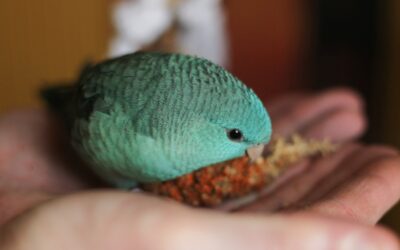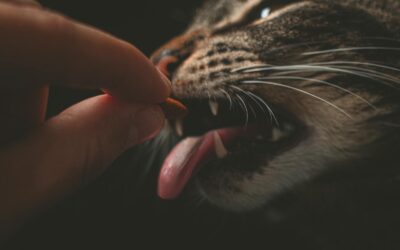Have you ever heard of the African soft fur rat? Our bet is you haven’t! These unusual rodents are kept as pets, but they’re not very commonly seen. A pity, because they can make a great choice for the right owner. Information about African soft fur rats is still quite difficult to find, so we decided it was time to compile a care guide.
Keep reading for everything you need to know about what an African soft fur rat is, whether it’s the right pet for you, and how to care for your ASFs!
What’s an African soft fur rat anyway?
Good question! When we think of rats, the first thing that comes to mind is often the big black or brown type that roams our city garbage bins. Not really an attractive idea. The African soft fur rat, also known as the Natal multimammate rat or the common African rat, is different. Although it’s neither a rat nor a mouse, its looks are definitely more “mouse-ish”—except for the fact that at 60 grams, it’s a good bit bigger than the average house mouse.
African soft fur rats, scientific name Mastomys natalensis, are naturally found in almost all of Sub-Saharan Africa. Here, the species pops up pretty much everywhere people do, relying on them for food.
Did you know? The “multimammate” thing refers to the female African soft fur rat’s many mammary glands (nipples). They have babies often, and they have many at a time, so the mothers need to be able to feed lots of pups at once.
Is an African soft fur rat the right pet for me?
African soft fur rats aren’t exactly as ubiquitous as “classic” rodent pet choices such as hamsters or rabbits. Still, both breeders and pet owners have been catching on to the fact that they can make great companions!
On the breeders’ end, they’re easy to produce in great numbers, which has led to all sorts of pretty color morphs popping up over the years. On the rodent enthusiasts’ end, they’re considered to be fun to keep and relatively clean.
Looking for a pet rodent to add to your family? African soft fur rats may be the right choice for you if:
- You have some experience with rodents. These rats can be bitey and need proper taming.
- You don’t mind a pet that isn’t the snuggliest (although this is very personal, some will be!).
- You’re willing to keep multiple. They’re very social!
- You don’t mind setting up a large cage full of engaging toys and hides.
- You don’t mind a nocturnal pet (although really, most rodents are nocturnal).
- You’re worried about that typical rodent smell. These rats are noted to be almost odorless.
If you’re interested in keeping African soft fur rats, remember that not every pet store will carry them by default. As mentioned, they’re not very popular as pets yet—they’re mostly known among snake keepers as live food for their ball pythons and other snakes!
You may have to ask your local store to order some African soft fur rats in for you, or even better, you can have a look online to see if there’s anyone in your area who breeds them. Rats raised by a responsible breeder or rattery are usually tamer and more used to being handled. Do keep in mind that this species is illegal in California and possibly in other states/countries due to concerns about its invasive potential.
Did you know? Although they’re a lot bigger, female African soft fur rats are sometimes used as companions for male fancy mice by mouse keepers. They tend to get along well and can’t breed together, which comes in handy if you don’t want to become a grandparent to dozens of mice or ASFs!

What does an African soft fur rat need?
Housing
In terms of housing, African soft fur rats are very similar to fancy mice. They just need more space! You can go for a wire cage (these guys love to climb) or opt to house your rats in an aquarium. Fill the cage with a nice layer of safe bedding, like aspen shavings, and add lots of hides, toys, chews, tubes, and climbing structures to keep your ASFs entertained. Don’t forget a wheel for them to run in either.
Because this species hails from tropical parts, it doesn’t respond well to cold. Your rats will appreciate being kept at room temperature or above. Although they’re not known to be smelly, their cages do need regular cleaning.
Diet
You can feed your African soft fur rats a regular rodent pellet for rats or similar species. Supplement with plenty of fresh veggies and some fresh fruit. And don’t forget protein: ASFs need a more meaty diet than some other species. They love bugs in particular, so you can offer live or dead insects like mealworms on a regular basis.
As always, be sure to offer multiple sources of fresh water. Clean water bottles and food bowls daily.
Social life
As mentioned, these rodents are very social. They live in groups in the wild, usually harems consisting of one male and multiple females. As such, they’re prone to getting lonely or depressed if you keep them on their own. Go for at least a trio—though be sure they’re all of the same sex or you’ll quickly be overrun. You’ll notice they love hanging out together, grooming each other, and sleeping in big piles. Keeping multiple females is best if you’d like to keep things peaceful.
As for your relationship with your rats, this species is known to be somewhat distant. It hasn’t been domesticated because it simply hasn’t been around as a pet long enough, but that doesn’t mean you can’t tame yours. It’s recommended to get young African soft fur rats and spend plenty of time handling them if you want a social pet that isn’t bitey. Still, they can be a little more aloof and skittish than something like a fancy mouse.
Problems
Although African soft for rats are considered easy enough to keep, there’s always a chance you’ll run into issues. Being prepared and knowing how to care for your furry friends is essential to making sure they thrive in the long run. Their lifespan is 2-3 years!
Some common issues include:
- Escape: Yes, these rats are noted to be true Houdinis. Make sure the cage is absolutely secure. Remember they can jump!
- Health issues: Take your rats for a vet check-up after buying them, plus once a year once you’ve got them. Common health problems include tumors, infection, and parasites.
- Aggression towards others: African soft fur rats can become aggressive if they don’t have enough space or if there are multiple males present. Their social structures are quite complex, and it’s best to introduce them when they’re still small.
- Aggression towards you: An untamed African soft fur rat will be bitey. Try to get yours when they’re small to make socialization easier. And remember that food is the best way to get any animal to trust you!
Conclusion
African soft fur rats make a unique choice for rodent enthusiasts looking for something a little different. They’re adorable to look at, not too high-maintenance, and fun to keep. If you don’t mind your pet not being overly cuddly, a trio of ASFs may be just the thing for you.
Sources







